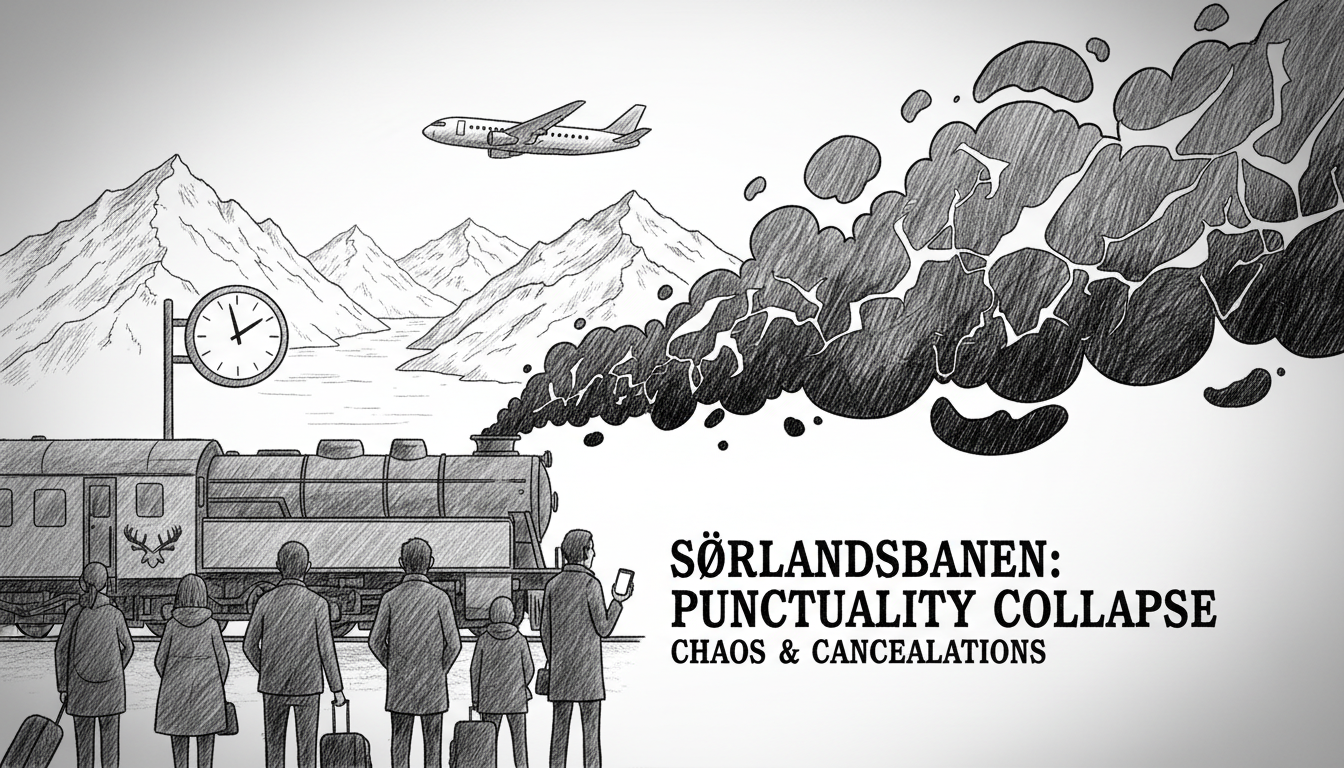Train reliability on Norway's Sørlandsbanen line between Oslo and Stavanger has collapsed, with frustrated passengers abandoning rail travel for flights. Recent statistics reveal nearly half of all departures on this critical southern route face cancellations during peak disruption periods.
The situation has reached crisis levels for daily commuters. On Wednesday alone, approximately 50% of scheduled trains were canceled due to technical problems. The Sørlandsbanen route operates approximately 19 daily departures between Oslo and Stavanger, serving major population centers along Norway's southern coast.
Regular passenger Finn Pettersen represents the growing exodus from rail travel. 'This is my last trip with Go-Ahead,' he stated. 'Now I'm starting to fly instead.' Pettersen frequently travels between Stavanger and Kristiansand but has grown tired of constant delays and cancellations. His new flight option requires connecting through either Oslo or Bergen, adding complexity but providing reliability missing from rail service.
Go-Ahead, the private operator responsible for the route, faces multiple challenges. Communications manager Oda B. Riska acknowledged the severity of the situation. 'Four of our eight train sets are currently out of service,' she confirmed. 'This is absolutely not good enough, and we're not satisfied in any way.'
The aging fleet presents a core problem. Trains operating on Sørlandsbanen date from 2000, sharing models with Oslo's Airport Express Train. These 25-year-old trains suffer from multiple technical issues, particularly with tilting systems designed for higher speeds through curves. Wear and aging have exacerbated these mechanical problems.
Infrastructure limitations compound the equipment failures. The Drammen-Egersund section operates as single track with excessive traffic relative to capacity. This bottleneck means even minor incidents create major punctuality deviations across the entire network.
Railway Directorate division director Erik Lund confirmed the service falls short of acceptable standards. 'There's no doubt the current offering isn't good enough,' he stated. 'We completely understand customers expect better delivery.'
Political responsibility has become a point of contention. Parliament representative Margret Hagerup places primary blame with the national government. 'The transport minister must step onto the field to rebuild trust in the railway,' she argued. Hagerup believes the government has deliberately made operations difficult and unpredictable for Go-Ahead.
Government officials point to increased funding as part of the solution. State Secretary Cecilie Knibe Kroglund highlighted budgetary increases. 'We're prioritizing operation, maintenance and renewal of the railway in the national transport plan,' she explained. 'We're following up in this year's national budget, increasing funding by another billion kroner in the 2026 proposal.'
The Railway Directorate has developed an action plan with industry partners to improve operational stability. This comprehensive approach addresses both train maintenance and better scheduled timetables. New long-distance trains are planned for introduction on Sørlandsbanen starting in 2028, though passengers face several more years of current challenges.
Go-Ahead assumed maintenance responsibility for the trains this summer after the state previously managed these operations. The transition period has revealed deeper systemic issues. 'We understand people get frustrated,' Riska acknowledged. 'The alternatives we can offer are replacement buses and different departures, but ultimately we need to fix this.'
The company focuses on returning two train sets with major technical faults to service while awaiting new wheels for a third set. 'Then we'll be able to return and deliver better production,' Riska committed. She accepted ultimate responsibility despite complex background factors including maintenance backlogs.
Recent months have seen multiple compounding incidents beyond the aging fleet. These include changing maintenance suppliers, a window falling out during operation requiring inspection of all train sets and approximately 150 cancellations, and Bane NOR's extension of track repairs at Drammen.
Parliament representative Ingrid Fiskaa, who regularly commutes by train from Stavanger to Oslo for parliamentary work, described the current reality. 'Right now there are more canceled departures than actual departures,' she reported. This assessment underscores how operational failures have overwhelmed basic service delivery.
The crisis reflects broader challenges in Norway's transportation infrastructure as it balances public service requirements with private operation. With passenger numbers clearly declining on Sørlandsbanen, the pressure mounts for rapid solutions before more travelers permanently switch to alternative transportation modes.

